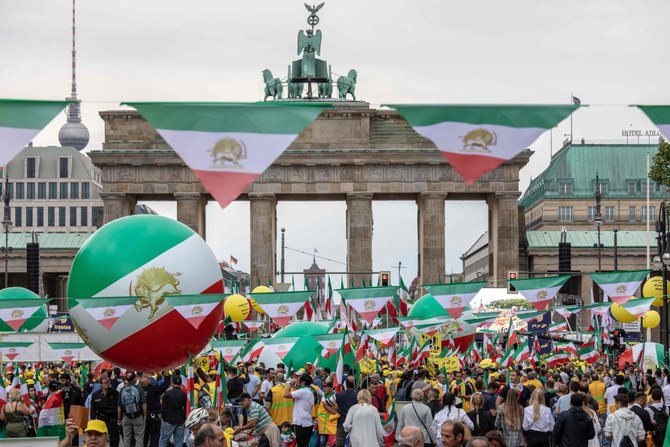LONDON: European powers must reinstate sanctions against Iran in response to Tehran’s breach of the international accord to curb its nuclear program, the Iranian opposition in exile warned.
Europe had been attempting to preserve the 2015 deal since Donald Trump withdrew the US last year. But Iran has reacted to heightened tensions with Washington by enriching uranium beyond limits set by the agreement.
The escalation has placed European leaders in a difficult position as they scramble to salvage the agreement.
Speaking to Arab News in London, Hossein Abedini of the National Council of Resistance of Iran’s (NCRI) Foreign Affairs Committee, said the only choice now is for Europe to ramp up pressure on Iran.
“The Europeans must immediately snap back sanctions,” Abedini said. “The brazen actions to breach the nuclear deal ... clearly show that the mullahs’ regime never abandoned its nuclear projects and it is trying to capitalize on a placating policy to pursue it once again.”
The NCRI, a Europe-based umbrella bloc of opposition groups that seeks an end to Iran’s theocracy, has spent years warning about Tehran’s atomic ambitions.
------
READ MORE
Trump accuses Iran of secret nuclear enrichment and warns of ‘substantial’ new sanctions
Pence says US action has cut off Iran’s ability to support terrorism
Iran faces one-week deadline to end its ‘nuclear blackmail’
------
But its message now comes at a critical time as Iran demands that Europe must maintain economic relations even as the US moves to isolate the regime.
A diplomat sent to Tehran by Emmanuel Macron held talks Wednesday with Iranian officials in a bid to stop the deal collapsing.
But at a recent rally in Germany, the NCRI’s president elect Maryam Rajavi urged Europe to stop appeasing the Iranian regime.
“Each euro traded with the clerics is a euro for fueling the Khamenei repression and war machine,” she said.
Any concession to Tehran, she added, increases the prospect of a “catastrophic war” by the clerics.
The 2015 deal, known as the Joint Comprehensive Plan of Action (JCPOA), was designed to curb Iran’s nuclear program and halt the country gaining a nuclear weapon. In response, world powers removed sanctions that had crippled the Iranian economy for years.
But many Arab countries, including Saudi Arabia, said the deal had merely allowed Iran to accelerate its missile technology and fund a foreign policy of stirring up trouble in the Middle East. Donald Trump agreed, and swiftly withdrew the US after he became president.
Opinion
This section contains relevant reference points, placed in (Opinion field)
He reinstated punishing sanctions on Iran’s economy, reducing its main income of oil exports to a trickle. In recent months the US also ramped up its military presence in the region and accused Iran of attacking oil tankers near the Strait of Hormuz.
Iranian President Hassan Rouhani warned European signatories of the deal last week that Tehran would “take the next step” in growing its enrichment of uranium from Sunday.
Iran’s Atomic Energy Organization confirmed Monday that Tehran had enriched uranium to 4.5 percent purity, beyond the deal’s limit of 3.67 percent.
Abedini said the announcement proved the Iranian regime has never given up its nuclear projects.
“Past experience shows that the regime has always deceived the international community about its real intentions,” he said.
“It is high time that the whole nuclear infrastructure of the regime is totally dismantled.”
US sanctions have also targeted senior figures in the Iranian regime, including the Islamic Revolutionary Guard Corps (IRGC).
Last month, Trump said he was imposing hard-hitting new sanctions, including on the office of Supreme Leader Ayatollah Ali Khamenei, in response to the shooting down of a US drone.
Abedini said sanctioning Khamenei and the IRGC are “the most imperative steps which will deny the regime funds it needs to continue its destabilising policies and repression at home.”



























